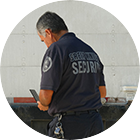AI has seen massive growth in almost all industries over the past year, changing how we do things. AI is fast changing the landscape, from autonomous vehicles revolutionizing transportation to chatbots enhancing customer service. The launch of Tesla's Robotaxi and Optimus robots has further extended the possibility of AI. Amid these rapid developments, one crucial question arises: Can AI replace security guards?
In the security space, as AI enters the scene, its capabilities, like advanced surveillance systems, facial recognition, patrol bots, and autonomous drones, all provide faster threat detection and real-time data analysis that, most of the time, surpass human capabilities. Presently, those within the security space collaborate with AI to address and improve their obligations. Whether or not AI will replace security guards is a conversation that is developing. However, let us look at how AI has impacted the security space and, by extension, has affected security guards.
AI in the Security Space
Industries are undergoing rapid transformation and automation, and AI research and development investment is also increasing rapidly. Despite the concerns around AI, many misunderstand what AI companies aim for. AI is meant to help reduce errors, increase efficiency, and streamline processes. It is not intended to eliminate human effort but to support it.
Both security guards and companies can leverage AI technologies to improve their work and services. Facial recognition, predictive analytics, and real-time surveillance are all tools that enhance security personnel capabilities. AI makes a company’s security guards more effective at their jobs. This allows them to detect threats better, respond more quickly, and offer more comprehensive security services. When you integrate AI into your company’s security services, you provide advanced, reliable solutions that increase your operational efficiency.
Security guards can use AI to monitor surveillance footage and detect suspicious activity, freeing them up to better position themselves to address the serious issues of the job. This means that security professionals can use AI to reduce the workload in these tasks so they can focus their work in areas where AI cannot help. In these problem areas, human judgment and decision-making are needed.
When companies embrace AI, they can continue to compete in a changing market, and clients get better, more innovative security services.
Why Adopting a Hybrid System that Incorporates AI and the Human Element is Beneficial
The adoption of patrol bots’ rise generated real fears among security guards that these machines could replace their roles. Patrol bots are equipped with advanced AI and sensors that can autonomously navigate premises and monitor for suspicious activity, issuing alerts when they detect potential threats. Companies looking for cost-effective security solutions are interested in their ability to perform tasks like surveillance and patrolling without human involvement. They also tout economic benefits as another advantage the patrol bots offer. These machines can reduce the chance of violent confrontation with intruders, thus saving lives.
However, as organizations start deploying patrol bots, many have realized the need for a hybrid method that combines technology with the human touch. Companies can optimize safety efforts by adding patrol bots to their security protocols while keeping human guards. Bots keep an eye on a large area and respond to routine incidents but lack the critical thinking and emotional intelligence that human personnel offer.
Human security guards bring crucial skills, including:
- The capacity to analyze complex situations
- Make finely nuanced calls for judgment and
- Connect with people
The result is a more complete security solution involving patrol bots and human guards. This type of partnership allows organizations to respond more effectively to several scenarios, addressing security issues without compromising the need for a human touch in difficult situations.
In certain situations, patrol bots respond too slowly to be effective. When immediate action is needed in highly stressful situations where split decisions are needed, these machines can get confused and give a delayed or inappropriate response. These delays can be deadly, especially in critical situations when every second is vital.
Patrol bots also face difficulties in challenging weather conditions. Adverse weather, like heavy rain, snow, or extreme heat, may compromise their ability to offer security solutions effectively. However, many of these robots rely on sensors that may not work as well in extreme conditions, leading to lapses in surveillance and response capabilities.
Further, patrol bots are prone to vandalism and malicious damage. However, their presence may draw in people who will exploit their weaknesses, causing expensive repairs and interruptions to security operations. This vulnerability raises questions about the long-term reliability of relying solely on technology for safety. Security robots also present companies with the potential of increased liability. The organization may be responsible for any adverse outcome. This will happen if a robot harms or fails to act as a human guard in a similar situation, especially where a human guard could have made a difference.
Emotional intelligence is also a key consideration in security. Emotional intelligence can help de-escalate high-tension situations, something that AI or patrolling bots are not great at. AI can analyze data and find patterns. However, it cannot fully understand human emotions. Security guards can read body language, decipher tone, and understand subtle cues to calm conflicts, which patrol bots and AI find challenging to do.
Bots patrolling the streets may be able to identify threats, but they lack empathy and judgment to deal with real-time confrontations. It shows how valuable human security people are. Security guards are trained to assess emotional status, make split decisions, and communicate to de-stress situations. AI finds it challenging to interpret human behavior and change its approach.
All these reasons are why a collaborative approach is a much better way to go.
What Labor Organizations and Unions Are Doing About the AI Uptake
As AI and robotics use rises, unions across industries are becoming more vocal about the threat to jobs. Unions representing security guards have been very clear in their stance against the increasing use of patrol bots and AI systems. These technologies are viewed as a direct challenge to the role of human security personnel in maintaining safety and order.
Machines cannot replicate the skills security guards have. Their ability to evaluate, make quick, correct decisions, and communicate is important in high-stress environments. While patrol bots are presently effective at surveillance and basic monitoring, they are simply incapable of sustaining the emotional intelligence or adaptability needed in more far-reaching situations. According to the unions, AI systems may be useful, but they cannot replace the human touch that is so vital in many security roles.
Unions are fighting to include contractual safeguards to ensure that AI does not eliminate human security guards. These protections include clauses that bar replacing guards with machines. Further, they believe AI must be incorporated as a supportive tool, not a job replacement. Unions also call for retraining programs that allow security guards to learn how to work alongside AI systems. Unions are also vocal about establishing clear boundaries on the role of AI in security operations.
Why, As a Security Guard, You Should Embrace AI
K5 security robots are a perfect example of AI technologies being adopted at a community level. These robots are deployed at different locations to proactively prevent crime. They work continuously, monitoring the area for suspicious activities and contributing to residents’ general sense of security. If they see anything unusual, they alert the human security team, which moves quickly. This hybrid approach marries AI technology with human expertise to allow AI to do routine monitoring while trained security experts can concentrate on the more complex scenarios that require judgment.
With the evolution of AI technologies, what seems like a challenge for AI that delays its adoption will be resolved. This means that with time, the reliance on security guards will progressively decline as the adoption of AI solutions increases. This reality is already evident. AI streamlines many routine security tasks, including real-time surveillance and automated threat detection. These technologies can be used to carry out several responsibilities very efficiently. However, security professionals must navigate challenges to remain relevant.
Instead of viewing this as a threat to your business, you should see it as an opportunity to grow. Understanding how AI fits your role is vital to thriving in this changing landscape. By learning these systems, you can increase your skill set beyond offering your physical presence at your post. This can position you as a valuable resource that could manage traditional security approaches while optimizing AI tools.
Using AI technology can boost your effectiveness in any security environment. These advanced systems simplify things and increase your ability to react to incidents.
Key Areas that AI Offers Solutions to in the Security Space
It is important to understand which areas companies are looking for solutions for to know why companies use AI solutions. Here are a few:
Access Control to Premises
Integrating AI into access control will streamline entry processes and maintain high-security levels. Critical systems of access control include facial recognition and biometric scanners.
Facial recognition technology identifies a person and distinguishes the identified person from another by analyzing their unique facial features. On the other hand, biometric scanners allow you to identify a user by checking their physiological traits, like fingerprints or iris patterns. Both systems provide far more reliable verification than traditional ID cards, which could be lost, stolen, or forged. With AI-driven systems, organizations can drastically decrease the risk of unauthorized access and only allow verified individuals to access restricted areas.
Furthermore, AI systems can overcome the constraints of human personnel in security roles. Humans may forget or make mistakes when making decisions in the verification process, but AI depends on objective algorithms that eliminate human error. Unaffected by fatigue or distractions, these systems continue to perform optimally and consistently in high-pressure situations. This reliability improves overall security measures by addressing shortcomings of human-based protocols.
AI access control systems can also adapt to changing security needs. As threats change, the access protocols can be easily updated to handle the new challenges.
Surveillance and Monitoring of Property, Building, and the Neighboring Environment
AI-powered systems actively transform real-time video feeds. These systems can quickly identify unusual behavior or potential threats faster and more efficiently than human operators. AI processes vast amounts of visual data to augment the surveillance setup and immediately alerts about suspicious activities.
These systems excel in tracking movements and recognizing patterns, significantly improving situational awareness. They can easily distinguish normal activities from anomalies, like activities in restricted areas or gatherings. This ability to identify possible security risks frees security staff to focus on real threats rather than reviewing hours of footage.
Further, AI integration in video surveillance makes it easier to allocate resources. Using AI to facilitate routine monitoring tasks, human operators can concentrate on high-importance events requiring their skill sets. The security team can focus on priority areas, while AI systems provide actionable insights to enable security teams to work more efficiently.
AI also supports real-time decision-making through video feed analysis. If AI detects a possible threat, it instantly notifies security staff, and the security personnel swiftly address the danger. This capability is vital in high-stakes environments, including retail spaces, airports, or large events.
Predictive Analytics
AI can help security by analyzing history, spotting trends, and predicting possible issues. With this advanced capability, organizations can proactively manage issues by anticipating them rather than only reacting to them. AI can examine past incidents and find patterns that indicate vulnerabilities so security teams can fix these weaknesses before they occur.
This predictive ability is critical to organizations that want to enhance security measures. For instance, once data analysis reveals that theft occurs at specific hours or places, security personnel can devise control measures like enhanced surveillance or adding extra security guards during critical times. These proactive steps allow organizations to reduce the probability of incidents happening dramatically and to make their environment safer.
Moreover, AI helps allocate resources more effectively by making it easier to forecast the possibility of security issues. Entities can strategically assign their resources when they understand when and where security threats will likely arise. This may span from increasing or decreasing staffing levels, investing in new technologies, and increasing security protocols in high-risk areas. These informed decisions can have a dramatic impact on the effectiveness of security and a corresponding impact on operational costs.
Coordinated Response With Security Guards and First Responders
In emergencies, AI coordinates responses and improves communication between security personnel and first responders, including police officers, EMTs, and firefighters. AI ensures that all parties get real-time information and can swiftly and efficiently take the necessary steps. AI systems immediately pass the information required to the site's security guards, allowing them to see what is happening. For example, if a security breach occurs, the AI will immediately alert the proper authorities, giving them all necessary information, including where the threat occurred, the nature of the danger, and any footage preceding the incident. By disseminating information to first responders, first responders can evaluate their approach and the allocation of resources.
AI also helps to connect various emergency response teams. The idea is to use AI to combine data from various sources, from security cameras to alarms to dispatch systems and create a holistic view of the incident. This approach improves situational awareness so security personnel and emergency responders can work together seamlessly. This, in turn, decreases response times and ideally increases the overall efficacy of emergency operations.
Furthermore, AI assists with managing logistics in emergencies by directing first responders through the safest routes to the scene. AI analyzes real-time traffic data and identifies potential hazards to optimize pathways for police officers, EMTs, and firefighters. This helps reduce delays and ensures help is there when it is needed.
Find Security Solutions Near Me
With the integration of AI technologies, security is evolving, and it is crucial to appreciate the invaluable role of human oversight in this ever-changing space. AI systems are excellent, providing real-time data analysis, efficient resource allocation, and streamlined communication in emergency situations. However, they will unlikely replace the nuanced judgment, emotional intelligence, and flexibility that a skilled security professional offers. Rather than looking at AI as a threat to job security, think of it as a way for collaboration to make everyone safer.
AI, combined with human expertise, is the future of security. AI tools for security personnel can help them optimize their performance so they can dedicate their attention to more complex situations that require critical thinking and the interpersonal skills they bring. As someone or a company looking for security solutions, this hybrid approach not only strengthens security operations but also guarantees you get all of the solutions you need, customized to your specific requirements.
Green Knight Security is your ideal choice if you are looking for reliable and experienced Los Angeles security professionals to protect your property or event. We know the value of merging state-of-the-art technology with human intelligence to provide the best security solutions. Contact us at 844-457-8326 today to learn how we can protect you and bring you peace of mind.







